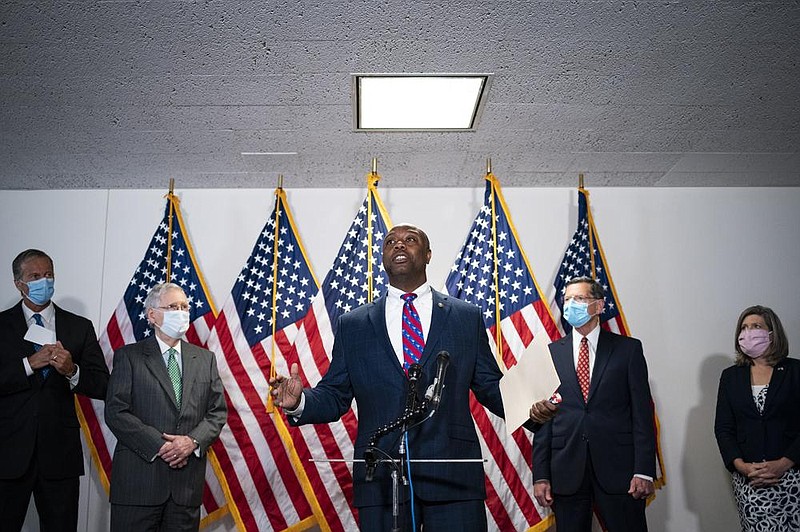WASHINGTON -- Congress is hitting an impasse on policing legislation, as key Senate Democrats on Tuesday opposed a Republican proposal as inadequate, leaving the parties to decide whether to take on the hard job of negotiating a compromise or walk away despite public outcry over the killings of black Americans.
The standoff threatens to turn the nationwide protests over the deaths of George Floyd, Breonna Taylor and others into another moment that galvanizes the nation but leaves lawmakers unable to act.
"This is a profound moment, it is a moral moment," said Sen. Cory Booker, D-N.J., a co-author of the Democrats' proposal. "The call is for us to act."
Booker, along with Senate Minority Leader Charles Schumer, D-N.Y., and Sen. Kamala Harris, D-Calif., sent a letter to Senate Majority Leader Mitch McConnell, R-Ky., on Tuesday, arguing for bipartisan negotiations on a policing overhaul bill before the legislation can actually advance to the floor.
Republicans have instead urged Democrats to let the bill proceed to the floor, where negotiations and amendment votes could occur to revise it.
[Video not showing up above? Click here to watch » https://www.youtube.com/watch?v=qK3lNnTfAIg]
The legislation written by Republicans, led by Sen. Tim Scott, R-S.C., is "not salvageable," the Democrats say, adding that "we need bipartisan talks to get to a constructive starting point."
"This is a serious challenge requiring serious solutions," the three senators wrote to McConnell in the letter, provided to The Washington Post in advance of its release. "Bringing the JUSTICE Act to the floor of the Senate is a woefully inadequate response, and we urge you to bring meaningful legislation to the floor for a vote."
Ahead of a test vote today, McConnell acknowledged that his party's proposal may fall short. If so, he vowed to try again, hoping to pass legislation before a July 4 recess.
Scott warned against a partisan, political debate that chisels away confidence in the nation's institutions.
"This is not about them or us," said Scott, the only black Republican in the Senate. It's about young people and others, he said, "who are afraid to jog down the street or get in their car and drive."
The GOP's Justice Act would create a national database of police use-of-force incidents, restrict police chokeholds and set up new training procedures and commissions to study race and law enforcement. It is not as sweeping as a Democratic proposal, which mandates many of the changes and would hold police liable to damages in lawsuits. There are similarities on some issues, lawmakers say, but also vast differences.
Schumer, Booker and Harris laid out several arguments against the GOP-drafted bill: That it did not hold police officers accountable in court, particularly by leaving intact the "qualified immunity" standard that Democrats want to erode so that it becomes easier for law enforcement officials to be sued for misconduct.
The senators also argued that the Republican legislation did not have sufficient transparency and provisions to provide the public a full picture of officer misconduct. The GOP bill also does not explicitly end practices such as chokeholds or no-knock warrants, which the Democrats say is unacceptable in a policing bill.
In a floor speech Tuesday, Harris indicated that she would vote to block the GOP legislation from proceeding.
"We can't answer the people's demand for accountability with watered-down politics," Harris said. "I will say we cannot answer their demand with this Republican attempt to obstruct real progress and real justice in our country."
Aides to McConnell declined to respond immediately to the letter, but the majority leader -- who has said the bill is "going nowhere" in the Republican-led Senate -- criticized Senate Democrats for their resistance to the GOP bill.
"The American people deserve better than a partisan stalemate," McConnell said."The American people deserve for the Senate to take up this issue at this time. Senate Republicans want to have this discussion. We are ready to make a law, not just make a point."
The partisan standoff raises questions about whether Congress is capable of responding to the incidents of police brutality, the nationwide protests and the demands for change less than five months before the election.
DEMOCRATS' BILL
As talks in the Senate continue, the House plans to vote this week on an expansive, Democratic-crafted bill that mandates several changes, including a ban on chokeholds, prohibitions on some no-knock warrants, and establishment of a national database to track police misconduct and make it easier to hold officers accountable for misconduct in civil and criminal court, among its provisions.
The House and Senate versions of the bills would ultimately need to be the same to become law.
House Speaker Nancy Pelosi has indicated she is eager to enter talks with the Senate over the two approaches, which is a signal that Democrats are not closing the door to a compromise. Neither bill goes as far as some activists want with calls to defund the police and shift resources to other community services.
There were few signs Tuesday that Republicans would accede to demands from Democrats to negotiate at least a bipartisan template for the bill in advance of the key vote today. Sen. John Cornyn, R-Texas, one of McConnell's closest allies, said he was "not really all that interested in negotiating with hostage-takers," referring to Democrats.
"I just think it's mindless, it's mindless obstruction," Cornyn said. "I just can't. This is the worst I've seen it."
OPPOSITION LINES UP
The signal from Senate Democrats that they will block the bill today came as the NAACP Legal Defense and Educational Fund, as well as the Rev. Al Sharpton and Benjamin Crump, an attorney who is representing Floyd's family, issued statements and letters urging senators to oppose the GOP bill.
"In this moment, we cannot support legislation that does not embody a strong accountability framework for police officers and other law enforcement who engage in misconduct as well as needed reforms to policing practices," the NAACP wrote to senators, according to a letter obtained by The Associated Press.
Crump said the Senate GOP bill as written stands "in direct contrast to the demands of the people" who have been protesting for far-reaching changes to policing policy in the wake of Floyd's death.
"The black community is tired of the lip service and is shocked that this $7 billion package can be thought of as legislation," Crump said.
The parties also face some degree of internal divisions within their ranks, with some Democrats likely to support advancing the bill today, and some Republicans proposing their own law enforcement changes.
For example, Sen. Rand Paul, R-Ky., proposes ending the practice of sending military equipment to local-level police departments, which is similar to a provision included in the Democrats' bill but not in the Republican package.
And Sen. Mike Braun, R-Ind., wants to limit the immunity protections for officers in lawsuits. The White House has opposed that in the Democratic bill and it's not included in the Republican package.
Information for this article was contributed by Seung Min Kim and Felicia Sonmez of The Washington Post; and by Lisa Mascaro, Laurie Kellman and Andrew Taylor of The Associated Press.


